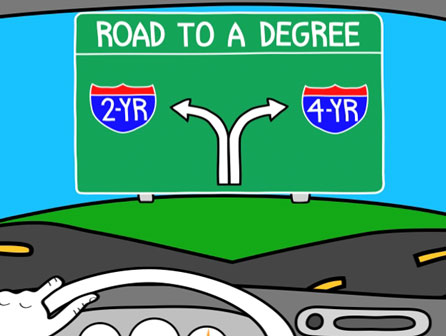Universities vs FET’s

So you’re in your final year of high school and you’re starting to thing beyond your school uniform and homework. Your biggest stress after writing your final exams is getting a higher education. Now that you’ve decided to actually get a higher education, the next question is where?? Your options being college or university, you would need to look at the pros and cons of both options. We’re here to help…
Universities
Advantages…
Greater sense of responsibilities
Post matric you legally qualify as an adult. Being an adult therefore means taking responsibility for yourself. Being at University will allow you as much freedom as you want but freedom could be what makes or breaks you. Your parents are not there to tell you when to eat, clean your room or when it’s time to study. This is a point where you will need to learn to manage your time well into your studies and other activities.
Increased Earnings and Opportunities
A major advantage in receiving a university education is that you may earn a higher salary than an individual with a high school certificate or a collage diploma. Your career choice may require advanced training. For example, the fields of medicine and law entail postgraduate study. Such fields tend to pay very well.
Specialization and Diversity
Students entering higher education have access to an unprecedented selection of classes ranging from general education requirements to highly specialized courses in challenging subjects such as aerospace engineering. Universities are continually developing new programs to attract prospective students and meet workforce needs. Many non-traditional aged students also find it beneficial to take classes to sharpen their skills in a competitive job market.
Social Benefits
Universities promote a social lifestyle that offers a chance to meet people from many different backgrounds. A healthy social life is all part of the experience of a university, and you’ll have an opportunity to develop new interests and explore a range of hobbies and sports, should you desire.
Disadvantages…
Obtaining a university education isn’t cheap.
It may be reasonably easy to get a student loan, but the money has to be paid back in the end, even if interest rates stay low. There is increasing competition to get into the best universities, so that many universities are charging students more money, meaning that students come out of university in greater debt than students would have in previous years.
Added fees
You not only have to pay tuition fees; you also have to find the money to pay for accommodation, nights out, as well as books and other bits and pieces that are required for your studies. You might be tempted to get a job while you study, but it can be extremely difficult combining a job and your studies, if you don’t want your grades to suffer.
Success is not guaranteed.
The theory is that a university education will give you access to higher paid jobs, so that although it might cost a lot to go to university, you will eventually make the money back, and more. However, there is no guarantee you will end up in a well-paid job, and so you could be left with debts that you are unable to pay off.
Isolation
University can be an intimidating place to be, and you may not feel like you belong there, especially if no-one in your family has ever been to university. University tends to be dominated by middle-class students, and so if you are at the lower end of the social scale you might find it hard to relate to other people. It doesn’t help that going to university usually means leaving home, so that you break from your former ties. You can find yourself missing friends and family, which may affect your studies.
No room for change.
You may not enjoy the subject you have chosen to study, but feel you ought to stick at it, even though you know for the next three or four years you are going to really struggle to motivate yourself.
Over-qualification Issue.
The biggest worry for those leaving university with a bachelor’s degree is that their achievements actually make them a less attractive prospect for some employers. While many graduates will enter careers of their choice, others will find that an overcrowded job market or tough competition results in the need to look at other fields of employment. In some cases, employers will reject individuals with degrees because of they believe college graduates are likely to leave the job quickly or will fail to fit into the business.
College
Advantages…
Preparation for Tougher Job Requirements
Throughout most of the 21st century a high school certificate was enough to get a job. Many companies had their own training programs and employed their workers for many years. Because of changes in the global job market, employers are looking for hire people who come fully trained in the profession. Jobs are changing constantly and top jobs ten years from now don’t even exist yet. A college education will help you meet these tougher job requirements.
Money matters
Even though you initially spend a large sum of money to begin your college education, you most likely will earn it back with the increased pay you receive from having a qualification with in-service training .
Options
You not only have more job options once you get your diploma, you now also have many options of how you want to obtain it. For people who are juggling a job and their education, colleges have become very flexible in their programs, offering online classes and part-time classes at night and weekends.
Social aspects
If you opt for going to college one of the best parts of going to a large college is the big campus.In addition, it has a lot of students, so anyone can make more friends. It also has a lot of facilities like huge library, cafeteria, playground, swimming pool etc. A large college gives students more chance to know a variety of students, teachers and scholars. Finally, a large college offers other rare opportunities like theatre, music, scouting and debates. A large college broadens the mind of the students and makes them ready for the global arena.
Disadvantage…
Cost
College is expensive. Most people do not have enough money to pay for their college education upfront, requiring them to take out loans. You may go out into the job field in debt. Student loans usually have a grace period of six months; if you don’t find a job in that amount of time, you may end up having to make high payments without having a paycheck.
You Don’t Always Need a Diploma
Many people are deciding to be entrepreneurs. If you are one of these people, a diploma may not be necessary. You may want to invest the money you would have spent on your diploma on going into business.
Delaying the Real World
If you decide not to attend college, you are able to get out into the real world to work, travel or volunteer. While you are able to do some of this in college, it is just a taste of everything there is to offer out there. There are programs for high school graduates that have many benefits, such as Peace Corps, Mission Year, study abroad and internships.
Commuter Effect
Community colleges don’t often have residence halls. While some do have on campus apartments or housing, the majority of community college students commute to class. Part of the traditional college experience is building social relationships and participating in clubs and extracurricular activities. While many community colleges offer such activities to encourage community involvement, a number of students drive to classes and leave straight for work or home. The lack of a feeling of belonging can inhibit a student’s overall experience.
Larger classes
Class sizes in large colleges are much bigger than in small colleges. If there are many students in the class, it is difficult to get personal attention from the teacher. Teachers in large colleges have to teach many students at one time, and may not even remember a student’s name. In addition, the atmosphere in large colleges is less friendly than in small colleges. A large college is not the right choice for students who prefer less people and more attention.






